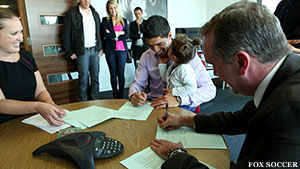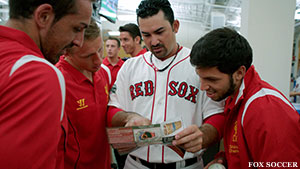
The way sports fans watch and appreciate their teams has fundamentally changed during the past decade.
While this is a multi-faceted phenomenon, it can be seen largely as a natural progression of technology. Put simply, the more cameras, the more access. This unfettered connection leads to the insatiable drive to know our athletes like we know our friends, and that can be as fulfilling for both parties. The fans are privy to a humanized athlete rather than a demigod, while athletes can form a strong and previously unobtainable connection with their supporters.
Shows like The Franchise, 24/7, The Journey, and perhaps most notably, Hard Knocks, have provided Americans with unprecedented access to their favorite teams. And as accustomed as we are to these programs, they are actually in their global infancy. Fans outside the U.S. are not used to seeing their athletes in this light.
And that’s what makes the Fox Soccer series Being: Liverpool (new episodes premiere Sundays at 1 p.m. and 9 p.m. ET) so groundbreaking. For the first time in its history, the once tightly-guarded Liverpool Football Club has opened its doors to the cameras, giving fans a brilliant behind-the-scenes look at one of the world's most popular sports franchises. (See below for sneak peek at the next episode.)
But this isn’t just an experiment in creative storytelling; this is the future of sports.
"This is the type of stuff that a younger generation likes to see," says Scott Boggins, the program’s Emmy Award-winning producer. "They really want to see what happens behind the scenes. And they want it to feel fresh, like it just happened. That's what this presentation really brings them. It really brings them into this world that they have never seen before. That's what makes it so enticing."

Boggins himself has been a catalyst for this sports television movement. During the past six years Boggins has teamed with HBO to produce various episodes for its 24/7 series that follows athletes and teams in the days leading up to a major event. Boggins has worked with NHL teams, world champion boxers and NASCAR drivers, but this was his first experience with soccer -- and a European club.
Boggins' resume and success with the "follow-style" show was much of the reason the Liverpool ownership group agreed to the program. Liverpool was bought in 2010 by the Fenway Sports Group, the company that also owns the Boston Red Sox. John Henry, Tom Werner and the other executives were familiar with the idea of programs like 24/7 and Hard Knocks, but this was an entirely new venture. Not only would Boggins be working in England, where many supporters were not accustomed to what they were doing, but Being: Liverpool is set over a span of months, while 24/7 usually only films for a few weeks at most. Boggins and his crew created a methodical framework and schedule for production, and even spoke to the team and the executives in Liverpool about the project.
Even after getting the green light for the show, the hardest work was ahead for Boggins. He knew that often the most challenging part of these programs was to gain the trust of the players and coaches, many of whom were accustomed to traditional media who aren't allowed in the locker room and who leave as soon as they gather their quotes. But to create a compelling show, the cameras for Being: Liverpool had to have much, much more access.
"Consistency is just huge," Boggins says. "The players don't want to get used to one or two people, and then all of a sudden halfway through they see fresh faces. That just goes counter to what we're doing."
Boggins said in his experience, the trust between the athletes and the crew grows significantly during a road trip. Not only are the cameramen, producers and writers spending quality time with the team (on planes, at hotels, etc.), but the players realize that the crew doesn't actually interfere with their main goal: Winning.

The increased comfort level is clear in Being: Liverpool. During and after the team's summer trip to Boston and Toronto, players start opening up to the cameras, and these moments truly create the best television.
In one scene, Liverpool's star Brazilian midfielder Lucas Leiva invites fellow South Americans Luis Suarez, Sebastian Coates and their families to his house for some mate (a tea-like drink) and Monopoly. It might seem mundane, but the scene illuminates the struggles these men face as they move halfway across the world to a country in which they know no one other than their teammates.
Another memorable moment from the first episode occurs when Liverpool manager Brendan Rodgers takes the cameras on a tour of his house and somewhat awkwardly introduces viewers to his daughter and her boyfriend (or as Rodgers calls him, her "special friend").
"Those are the moments that make this type of television really compelling," Boggins says. "When you really get to see these guys off the pitch. When you get to see them away from work. When you get to see these guys as dads. When you get to see these guys as husbands. That's when it really, really becomes great."

Boggins has become very familiar with Rodgers, who might be the closest man in the show to a main character. Rodgers is in his first year as manager, and his lunch-pail attitude and team-first mentality shine through in all of his interviews, pre-game speeches and interactions. During his first tour of Liverpool's training facilities in Melwood, Rodgers is sure to introduce himself to everyone from the secretaries to the chefs, saying that if Liverpool is to win consistently, they will have as much to do with the success as he will.
"When I spend time with John Tortorella of the New York Rangers and now time with Brendan Rodgers, there's a lot of similarities," Boggins says. "Both of those men love their players and they love to teach. Their sports couldn't be more different, but the approach is so much similar than you would think."
While Being: Liverpool is just halfway through the season, it has already provided media and fans alike with an entirely new side of their beloved football club. In a review of the show published in The Guardian, Sam Wollaston called Being: Liverpool "a sneaky peek into an endlessly fascinating world."
In an interesting twist of timing, the show ends just as the squad is beginning its season. But no matter, our appetites have already been whetted. Now we are familiar with the characters and the club itself, and we are much more inclined to follow. And in a way, that's exactly what the show was meant to do.








